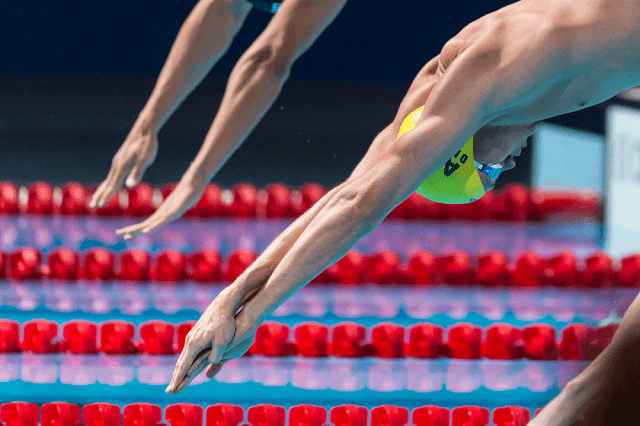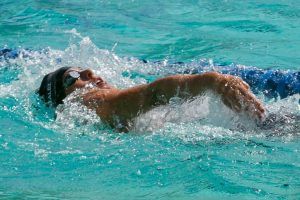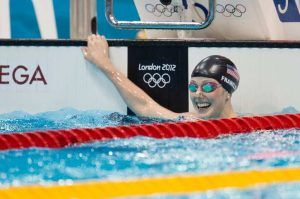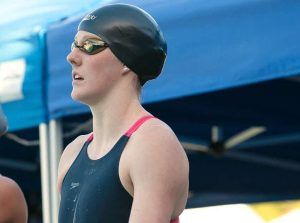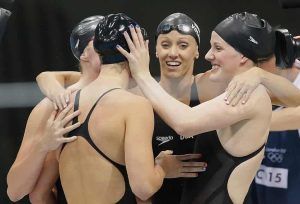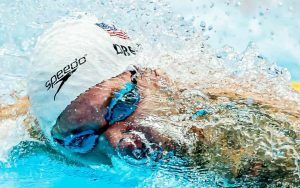The swimming season is a long haul.
I know it, you know it. While we still have some decent weather in most parts of the world right now, in a couple months a whole bunch of us are going to be dealing with shortened days, long nights, and with those shorter days the first few dips in motivation that usually comes when the excitement from September begins to wear off.
Think of this list as your little Swiss army knife of motivation. Bookmark it, and save it for those days where you need a jolt of inspiration to get back to the pool.
And here we go:
1. What’s your vision?
Write out what you want to do with your swimming career. What do you want to accomplish? Go to the Olympics? Win state champs? Anchor the relay team? List out all of the cool stuff that you want to do with the sport. Don’t overthink it – dream away. Just make sure you write it down. Thoughts come and go, float away and get forgotten. Put it down to paper.
2. Color the choices.
Play some mental trickery on yourself by outlining three choices. Choice #1 is head out the door to practice. Choice #2 can be to do every household chore you can think of, and Choice #3 can be something just as irrational, like go for a 30 mile run. Make sure the other two choices are things you would absolutely never, ever wanna do. You’ll discover a little surge of excitement and gratitude for “only” having to go to the pool. Aren’t our brains wonderful, confusing things?
3. Surround yourself with positive people.
Being surrounded by people who are constantly digging at one another (and you), complaining, and being otherwise unawesome is a true bummer. Not only is their negativity infectious, but it takes your focus off of the things that matter. Like your goals. Seek out swimmers and peers that have a positive outlook, and don’t engage people who live to complain.
Another way you can surround yourself with positive role models is to keep a list of your favorite motivational swim quotes handy.
4. Challenge yourself on the regular. Staying within the comfort zone is a one way ticket to Boresville. Each day challenge yourself within practice; there are fewer things more rewarding and more motivating than being able to say that you have done something for the very first time, or done something better than you ever have before.
5. Catch up on your sleep.
Oh, yeah. I know at least a few of you will be abusing this one. (“But mom, the guy from that swimming website said that I need to sleep more, so I should probably sleep in until 1pm tomorrow…”) Ever notice how hard it is to get going when you are a big old sleepy-face? Of course you have. What you may not notice is that your willpower feels weakened when you are in a drowsy state. Numerous studies have shown that getting added sleep improves performance and cognitive function (a.k.a. making a better decision when it comes to passing on a hard set or not). Guilt free sleep? Yes, please.
6. Develop positives from your setbacks.
We get way too bent out of shape when things don’t go our way. We take it personal, get down on ourselves, and lose any hope for finding silver linings. Instead, the next time something happens to knock you off your butt, sit down and write out three positive things that will come out of this disaster. It will get you refocused and re-motivated quickly and abruptly.
7. Stop thinking about your big goals.
Okay, okay, I know I am contradicting myself a little bit here, but these tips are to be applied according to your specific circumstance, and on this particular day you might be feeling a little bummed out thinking about how far away the accomplishment of your goal really is. Instead of thinking about that big, awesome goal, focus exclusively on the things you want to achieve today.
8. Link up with a teammate.
Partner up with a teammate for the year and make each other “Thunder Buddies”, err, “Accountability Buddies.” Pinky swear each other that you will be there for each other during those early mornings, be willing to to keep on each other when the other slides, and to relentlessly and enthusiastically cheer for one another during tough workouts. Depending on how aggressively competitive you and choice buddy are, you may want to consider partnering up with someone who doesn’t compete against you in your best events. Or not. Your call.
9. Write down your goals for the week.
The idea of having your season end goal written down and posted up is a good one. But when you put something up on the wall it’s not long until it fades into the rest of your room. In addition to your season end goal, set goals and objectives for the week each Sunday night. Things you want to do within practice. Things you want to do on your own. Attendance targets. And so on. Having to continually and repeatedly do this will refresh your brain on your goals, and will provide you with immediate and meaningful targets to chase.
10. Institute the 2 minute drill.
How many times have you delayed getting into the water, for fear of the big workout ahead, with you simply not feeling it? Probably more times than you can count. But then what happened? You finally got in, took a few strokes, and soon enough you were mysteriously “feeling it.” Simply starting something is often all we need to get into the groove of things. You can use this same topic elsewhere: with a big homework assignment promise yourself that you will write for 5 minutes, and see where it goes. Struggling to find the drive to go to the gym? Promise yourself that you will walk through the doors, and simply warm up. Set your eyes on the (very manageable and not threatening) first couple minutes of your task, and things will roll from there.
11. Chase mastery.
Ever notice that when you get really good at something you end up really liking it? In high school I was always intimidated by Math, but once I nailed a specific concept I suddenly liked that section. Being masterful at something starts with being curious; learn as much as you can about the sport, about your race, about technique and drag and propulsion and all of the other little things that makes our sport awesome. We tend to dismiss or loathe the things we don’t understand or know about. Getting curious, and then starting down the road towards mastery, reverses that ignorance into passion and fire.
12. YouTube some of the sport’s epic performances.
With our smartphones consistently at our side we always have access to a vast library of the sport’s greatest moments. They can be the source of a quick fix of inspiration when you need it most. If you watch Jason Lezak’s rallying comeback in Beijing and don’t feel some a surging and overwhelming urge to go smash out a workout, than you just may not be human.
13. Let go of what you cannot control.
There are things we can control with our performances, and things we certainly can’t. When we drive focus and mental energy on the latter we take our eyes off of what we have power of, creating a double-whammy of setbackiness (trademark pending!). Releasing yourself of getting bent out of shape over stuff you can’t influence keeps you properly focused on your performance, your swimming, and ultimately, your results.
14. Pick a quote for each day.
Each morning, or the previous night even, pick out a motivational swimming quote that you are going stand by over the course of the day. If you know that you are going to have an exceptionally difficult practice later that night, go with something along the lines of Winston Churchill’s, “If you’re going through hell, keep going.” You can write out the quote on the top of your hand, or screenshot it and use it as the background on your cellular.
15. Write down your workouts.
There are about 1,756 reasons you should record and measure your workouts and training, and perhaps the most powerful of these is the jolt of motivation you get from writing out a great workout. Consistently tracking your workouts also has the curious effect of keeping you on your toes during your practice; the last thing you want to do is go home and write out that you had a bed-wetter of a session in the water.
16. Create an environment that promotes success.
Similarly to choosing a peer group that infuses you with positivity, create an environment around you that encourages success. Having your goals posted up somewhere prominent is a good start. What about some motivational quotes and posters of your favorite athletes? What about the foods and liquids you keep in the fridge? Look around you and ask yourself, are there things I could be doing to create an environment that make it easier for me to succeed?
17. Finish what you start.
There are fewer things more crushing to a swimmer’s confidence and motivation than not completing what they set out to do. When you tell yourself that you are going to complete a workout, finish a cycle of training, or complete a team commitment, hold yourself to it. The moment that you become overly flexible with your personal integrity is the moment that your word becomes worth next to nothing.
18. Watch how the best do it.
Check out how the best performing athletes on your team train. What their attitude is to hard work. Seek to emulate the swimmers on your team by approaching training in the same way. If you are the top dog in your area or on your club than reach out to coaches and swimmers nearby who are performing at the level you are aspiring to. You’d be surprised at how willing people in the swimming community are to sharing knowledge.
19. Help the younger kids.
After years and years in the sport it can be easy to lose that childhood enthusiasm we had for the sport. Sure, our goals may still excite us, but it’s hard to say if we’ll ever recapture that innocent and outright pure love for the sport that many youngsters exhibit. Tap into that by helping out with the younger kids on your team. Not only will you be doing the club a service by passing on your knowledge and experience, but you will get a nice refresher on how much you do love the sport deep down.
20. Own your hang-ups. Do you find yourself doing the same self-sabotaging things in practice/life? Consistently giving up too early on tough sets? Are you always getting psyched out by intimidating workouts? Step one is to figure out what the problem or hang-up is, and the second part entails writing down a solution to it so that you have a weapon at hand the next time it happens.
21. Acknowledge and enjoy the wins.
All too often I’ll see an athlete downplay the awesome performance they put down in the pool. They will shrug off a great workout and find something negative to say about it, “Yeah, but I don’t swim like that all of the time…” Enjoy the wins, you deserve it. Make sure that you reward yourself for when you knock it out of the park. Just make sure that the reward doesn’t run counter to what you are trying to accomplish in the water.
22. Change it up.
If variety is the spice of life, inject some into your training to keep things fresh and engaging. Swimming back and forth, doing countless flip turns for hours on end can be hum-drum enough, but doing the same thing every single day is the swimming version of the movie Groundhog Day. Your brain will get burnt out long before your body does, so be sure that you are doing your part to keep training not only challenging, but also stimulating.
23. Elevate your definition of hard work.
We all think that we know what hard work is, but there will always be someone out there who is doing it harder and better. Michael Phelps didn’t take a single day off for nearly five years in the lead up to the Beijing Olympics. Christmas? Yup. Birthdays? Yup. His coach, Bob Bowman, lived by a philosophy of creating an environment for Phelps where he would do what no one else would. Will you?
24. Have a trigger.
Create a set of cues that you start before your practice, or before your main set, or whenever else you need a rapid-fire dose of intense motivation. The trigger can be a few different things, including a physical action (like slapping your chest and quads), to unleashing a kick-ass mantra (“It’s go time! Let’s roll!”). Do the same sequentially, and once you start them commit! This is important, because once you do it enough times it’s like you have trained yourself to unleash awesome. You’ll start the cues, and then your body will simply take over.
25. Stay positive in the middle of the storm.
Is this a broad point? Yes. Is it simple? Maybe. But is it hilariously and overwhelmingly effective? You know it. A tactic that I have seen to be effective in creating a more positive head-space is the “Hello-Goodbye” technique. The next time you have a negative thought, recognize it (“Hello!”), and then promptly wish it happy trails (“Bye, bye!”). By being conscious of those nasty thoughts, and then dismissing them will do wonders to keep you in a more positive, motivated state of mind.
Take Your Swimming to the Next Level
YourSwimBook is a log book and goal setting guide designed specifically for competitive swimmers. It includes a ten month log book,
Learn 8 more reasons why this tool kicks butt now.
Join the YourSwimBook weekly newsletter and get motivational tips and more straight to your inbox. Sign up for free here.

